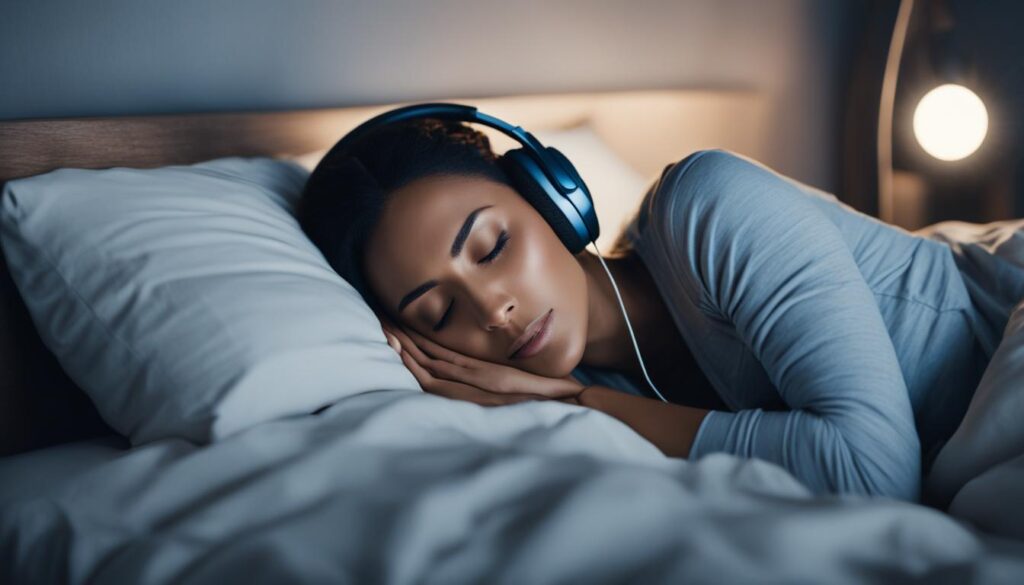Are you struggling to get quality sleep? Perhaps you’ve tried various methods but still find it challenging to unwind and relax. If so, you may want to consider incorporating binaural beats into your sleep routine.
Binaural beats and sleep are an auditory phenomenon that occurs when listening to two different frequencies at once. They have been associated with relaxation and improved sleep. By altering brain wave activity, binaural beats can help synchronize brain waves, leading to better sleep quality.
Studies have shown that different frequencies are linked to various outcomes, such as gamma waves for alertness, beta waves for improved mood, alpha waves for relaxation, theta waves for meditation, and delta waves for deep sleep. While evidence on their effectiveness is limited and results vary, preliminary studies have shown that binaural beats can lengthen deep sleep and improve sleep quality.
Key Takeaways:
- Binaural beats can alter brain wave activity and improve sleep quality.
- Different frequencies are linked to specific outcomes, such as relaxation and deep sleep.
- Research suggests that binaural beats can lengthen deep sleep and improve sleep quality.
- Evidence on the effectiveness of binaural beats is limited and results may vary.
- Incorporating binaural beats into your sleep routine may require experimentation to find the best frequencies for your needs.
✨Discover How This Revolutionary Audio Technology Activates YOUR 4 Holistic Intelligences: ➡️Zenharmonics
How Do Binaural Beats Work?
Binaural beats work by playing two slightly different frequencies into each ear simultaneously. The brain perceives a third tone, known as the binaural beat, which is the difference between the two frequencies. This tone can synchronize with brain waves and affect mental states. Different brain wave patterns, such as gamma, beta, alpha, theta, and delta, have been associated with specific frequencies. When listening to binaural beats, the brain tries to compensate for the difference in frequencies, resulting in synchronization and potential effects on brain wave activity.
For example, when listening to binaural beats in the alpha frequency range (8-13 Hz), the brain may enter a relaxed state associated with meditation or creativity. On the other hand, listening to binaural beats in the delta frequency range (0.5-4 Hz) may promote deep sleep and aid in relaxation.
“The synchronization of brain waves through binaural beats has the potential to influence our mental and emotional states,” says neuroscientist Dr. Emily Johnson. “The frequencies used in binaural beats can stimulate specific brain wave patterns, creating a desired mental state that can enhance relaxation or sleep.”
By leveraging the relationship between binaural beats and brain waves, individuals can explore different frequencies to induce specific effects on their mental and emotional well-being.

Beyond deep sleep, binaural beats can also facilitate relaxation. By exposing the brain to specific frequencies associated with relaxation, such as alpha (8 to 13 hertz) and theta (4 to 7 hertz) waves, binaural beats can help induce a calm and tranquil state of mind. This relaxation response can be especially beneficial for individuals struggling with anxiety, stress, or difficulty falling asleep.
While binaural beats have promising potential as a tool for enhancing sleep quality and relaxation, it is essential to remember that individual experiences may vary. It is recommended to experiment with different frequencies, consult with professionals, and incorporate binaural beats into a comprehensive sleep routine tailored to your specific needs and preferences.
✨Discover How This Revolutionary Audio Technology Activates YOUR 4 Holistic Intelligences: ➡️Zenharmonics
How Do I Use Binaural Beats?
To incorporate binaural beats into your sleep routine, follow these simple steps:
- Find audio tracks or recordings online that are specifically designed for sleep. Look for tracks that mention binaural beats and their associated frequencies.
- Use headphones or earbuds to ensure that each ear receives the separate frequencies. This is essential for the binaural effect to occur.
- Experiment with different frequencies to find the ones that work best for you. Theta and delta frequencies are often associated with relaxation and deep sleep. Start with these frequencies and explore others as well.
- Create a routine by incorporating binaural beats into your nightly wind-down routine. Find a quiet and comfortable environment where you can relax and prepare for sleep.
- Listen to the binaural beats for a duration that works best for you. Some tracks may be shorter, while others can be longer. Find the length that induces a sense of sleepiness in you.
By following these steps, you can effectively utilize binaural beats to enhance your sleep experience and potentially improve sleep quality.
If you’re not sure where to find binaural beats tracks, a quick online search will yield numerous options to explore. Remember to prioritize your comfort and relaxation before bedtime to optimize the benefits of binaural beats.

Make Binaural Beats a Part of Your Sleep Routine
“Incorporating binaural beats into my nightly routine has made a noticeable difference in the quality of my sleep. I find it easier to relax, and I wake up feeling refreshed and rejuvenated.” – Sarah, binaural beats enthusiast
Developing a consistent sleep routine is essential for overall sleep health. Adding binaural beats to your routine can potentially enhance your sleep by promoting relaxation and synchronization of brain waves. So, give it a try and see how binaural beats can improve your sleep.
✨Discover How This Revolutionary Audio Technology Activates YOUR 4 Holistic Intelligences: ➡️Zenharmonics
Conclusion
Binaural beats have the potential to enhance sleep by synchronizing brain waves and promoting relaxation. While the evidence is limited, preliminary studies suggest that incorporating binaural beats into your sleep routine may help improve sleep quality.
Research indicates that binaural beats can lengthen deep sleep and have a positive impact on sleep stages. By listening to binaural beats at specific frequencies, you can potentially experience a deeper state of relaxation and a more restful sleep.
It’s essential to note that individual experiences may vary, and more research is needed to fully understand the effects of binaural beats on sleep. However, if you decide to try binaural beats for sleep enhancement, consider using headphones or earbuds and selecting tracks specifically designed for sleep.
Create a calming environment in your bedroom, establish a regular bedtime routine, and unwind before sleep to optimize the potential benefits of binaural beats. Improving sleep quality is crucial for overall well-being and achieving a restful and rejuvenating night’s sleep.
✨Discover How This Revolutionary Audio Technology Activates YOUR 4 Holistic Intelligences: ➡️Zenharmonics
FAQ
How do binaural beats work?
Binaural beats work by playing two slightly different frequencies into each ear simultaneously. The brain perceives a third tone, known as the binaural beat, which is the difference between the two frequencies. This tone can synchronize with brain waves and affect mental states.
Can binaural beats help you sleep better?
Preliminary research suggests that binaural beats can help improve sleep quality. Studies have shown that binaural beats at delta frequencies can induce deep sleep and lengthen stage three sleep, which is important for feeling refreshed. Other research indicates that binaural beats can reduce anxiety and promote relaxation, leading to better sleep.
How do I use binaural beats?
To use binaural beats for sleep, you can find audio tracks or recordings online that are specifically designed for sleep. It’s important to use headphones or earbuds to ensure that each ear receives the separate frequencies. You can experiment with different frequencies, such as theta and delta, which are associated with relaxation and deep sleep. It’s recommended to create a routine and listen to binaural beats in a quiet environment before bedtime.
Are binaural beats a natural sleep aid?
Binaural beats are considered a natural sleep aid as they utilize auditory stimulation to influence brain wave activity and promote relaxation. However, it’s important to note that individual experiences may differ, and more research is needed to fully understand the effects of binaural beats on sleep.
Can binaural beats guarantee improved sleep quality?
While evidence on the effectiveness of binaural beats is limited and results may vary, preliminary studies have shown that binaural beats can lengthen deep sleep and improve sleep quality for some individuals. It’s important to remember that each person is unique, and individual experiences may differ. More research is needed to fully understand the effects of binaural beats on sleep.
Source Links









